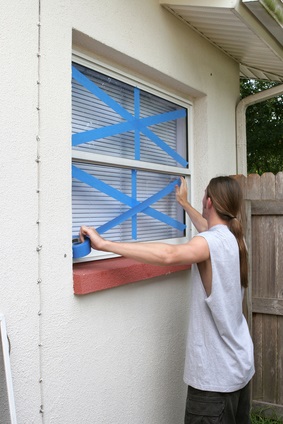As we prepare for hurricane season in Florida, we will be working closely with our EasyLiving home health clients to review their plans and help them get prepared. Our care managers are even available to help seniors who are not current clients but wish to have assistance with properly preparing. Our affordable Hurricane Preparation Package helps you ensure you are ready to face whatever the season brings (or have the peace of mind that your loved ones in Florida are prepared). Contact us at 727-447-5845 to find out more.
We thought we’d kick off the season by reminding our readers of “what not to do” so you can get ready for the season the right way. Here are some of the top mistakes people make in preparing for hurricane season (especially relevant to elders or those with mobility/disability issues):
- Using improper methods to secure your home (or mistakenly believing your home is secure). The picture above illustrates this point, as taping windows is not an effective protection. Other common mistakes include parking a car up against a garage door in order to protect it and cracking open windows to relieve air pressure. Additionally, many people in high rises feel they will be safe from storm surge because of being on a high floor, neglecting to think of all the other dangers (including being stranded on a high floor with no supplies, electricity/elevator or water). Strapping down a mobile home does not mean it is safe in a storm, either.
- Focusing on the storm’s immediate impact, not the aftermath. The aftermath is often the most dangerous time, especially for elders and individuals who rely on care assistance or have poor health. Even a minor storm can be deadly when supplies are cut off and people are stranded at home without electricity or help. People in storm-ravaged areas may die from health issues that are exacerbated during this time or accidents (generator fires, explosions, electric shock, falls while clearing debris, etc.).
- Preparing insufficient supplies. Again, the aftermath of the storm is often deceptive and people only think about needing supplies for a few days. Remember, services may be cut off for weeks. An elder may have difficulty getting to supply points, so even if disaster relief comes into the area it may not help. Having sufficient water is especially important and heat-related illness is particularly dangerous for older adults. It is also vital to have adequate supplies of medications and consider special equipment needs.
- Overestimating your abilities. We typically strive to help elders maximize their abilities and live life to the fullest, but when it comes to storms, this is a time to be conservative and cautious. All of us are vulnerable to the dangers of natural disasters and need to understand our specific vulnerabilities. Our Aging Wisely care managers do a personal evaluation when they help a client with a Hurricane Preparedness Package. This assessment evaluates how well a person/couple can self-preserve, as well as looking at the home environment and physical location. We always encourage independence and try to help ensure age, disease or disability do not affect quality of life…but in the case of storms, the minor inconveniences related to preparation and evacuation are secondary to safety and survival.
- Basing your decisions on the past. This relates to #4 in that you have to consider your current abilities, but it also relates to the common statement, “We’ve lived here for X# of years and always been fine.” We cannot predict exactly what nature will bring and just because we have been fortunate in the past does not mean we should be blind to the dangers. Additionally, as recent storms show people difficulties in getting supplies and evacuating, more residents will take action earlier. This will leave those who don’t take precautions early with few options.
Be aware, be prepared! Check out our hurricane prep list and you can also search our blog for many past articles with tips and resources for emergency preparedness and home safety.


